On a cold, windswept morning, HMS Prince of Wales sat in the dock at Liverpool, its imposing silhouette blending seamlessly into the overcast Mersey skyline.
The weather seemed fitting, the grey of the ship’s hull merging with the brooding sky as if reflecting the ship’s steadfast nature and readiness for its role as the Royal Navy’s flagship.
Stepping aboard HMS Prince of Wales is an experience that evokes a deep sense of respect for the power and complexity of such a vessel. The low ceilings and tight corridors, lined with steel, immediately set the tone for the seriousness of the environment. Each step across its metal decking echoes the weight of its purpose. For those unaccustomed to life aboard a warship, the lack of natural light and the ever-present hum of the ship’s systems might seem daunting, but it’s clear this is a space built for survivability.
Onboard @HMSPWLS, George Allison spoke to Captain Will Blackett about the ship’s role as flagship, its connection to Liverpool, and what the sight of a British carrier means to adversaries and allies alike. #HMSPrinceOfWales #RoyalNavy pic.twitter.com/96dgUJNoYT
— UK Defence Journal (@UKDefJournal) December 3, 2024
I was given the chance to interview Captain Will Blackett in the ship’s cavernous hangar, a space that feels like the beating heart of the vessel. Surrounded by aircraft lifts and the tools of naval power projection, we chatted about a range of topics, from the significance of the flagship role to the deep ties between HMS Prince of Wales and Liverpool, as well as the ship’s preparations for her upcoming global deployment.
Reflecting on what it means for the carrier to take on the flagship role, Captain Blackett described it as a milestone built on years of effort. “Well, it’s the culmination of a lot of hard work. It’s the first time this ship has held that duty, and we have stood up over the course of four years. We’ve overcome quite a lot of challenges.â€
His own time aboard began after a significant repair to the ship’s propeller system, a hurdle that tested the resilience of the crew. “I’ve been here for a year, and I’ve joined a ship that had come from the propeller repair that you have spoken and written about in the past, all the way through to this point here, which is effectively a year of really hard work,†he explained. “Putting the ship through her paces, materially, putting the team through their paces from a training perspective, and bringing it all together to say we’re ready to go.â€
The HMS Prince of Wales’ connection to Liverpool, its affiliated city, is a source of pride for both the crew and the city. Captain Blackett highlighted the deep historical ties: “The connection between a ship and her affiliated home city is quite difficult to describe. It’s a really special thing. It lasts the life of the ship. So it’s not about the individuals here now. We’re just bit players in a 50-year span of history.â€
He highlighted the mutual pride between the city and the ship: “We talk about Liverpool with pride, the city talks about the ship with pride.†On a personal level, he shared his admiration for Liverpool’s maritime legacy: “Liverpool specifically has got such an unbelievably rich maritime history. Did you know that we built warships here right back as far as the 18th century? There were, I think, 38, 39 wooden warships built here for the Royal Navy, all the way back then.â€
Liverpool’s role in wartime also stood out to Captain Blackett. “Leading all the way up to the amazing stuff through both world wars, with regard to effectively the strategic hub for cross-Atlantic convoys. And then actually, the Western Approaches Command was here through the ’40s, through the war. All of that means the city was a target. It means the city faced the peril of war fighting, whether the people in the city were military people or not.â€
This historical bond fuels a shared sense of duty for the crew of HMS Prince of Wales. “I think there’s a real deep connection for me about the duty that this city has done for the country and the duty that we stand here ready to do now, which is ultimately we’re going to do what’s best for the nation, put ourselves in harm’s way if necessary, and stand up and be proud about it.â€
Looking ahead to the ship’s deployment as part of Carrier Strike Group 25, Captain Blackett expressed his hope that HMS Prince of Wales’ presence on the global stage would send a strong message. “I hope it demonstrates our credibility as a modern, ready Navy. I think we spend a lot of time talking about what we’re not good at, but I can tell you, I hope that as you stand here in the hangar and look at what an amazing thing this is, that it shows you—and I will show the same message to anyone who wants to come and have a look anywhere around the world—that the UK is capable of building absolute cutting-edge technology and take it anywhere we need to take.â€
As the conversation wrapped up, Captain Blackett summarised the mood aboard the ship with one word: “Excitedâ€



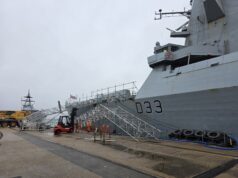
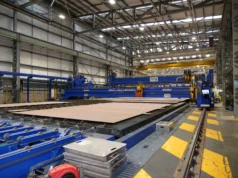
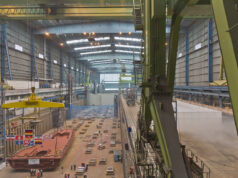

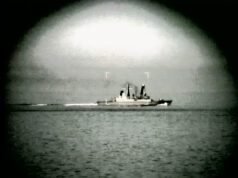
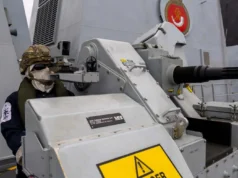

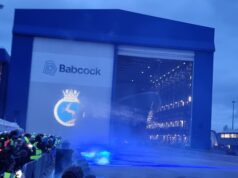
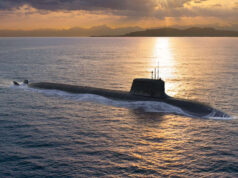
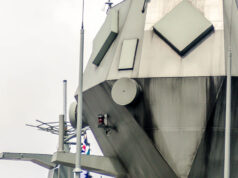

Sticking an extra western carrier in the pacific is a key bit of deterrent. The importance of which cannot be understated, especially when we know we have any enemy weighing up the “ should I trigger a world war†prose and cons.
Great short interview. Captain Will Blackett comes across as a good communicator. As you would hope from a senior leader.
A a time when our nation needs its armd forces more than ever our government is sitting on its hands. We need better armour, better weaponry and more effective land, air and sea support!